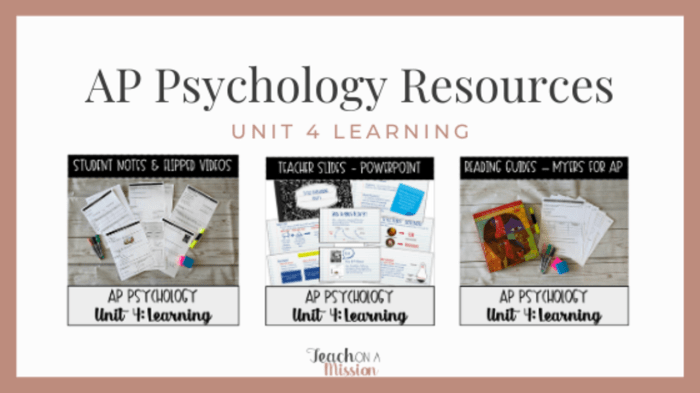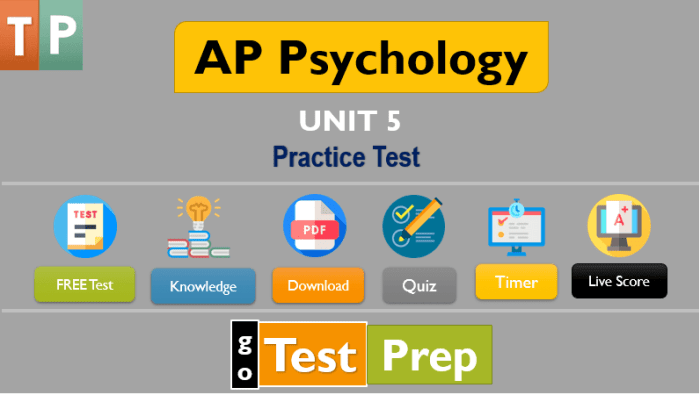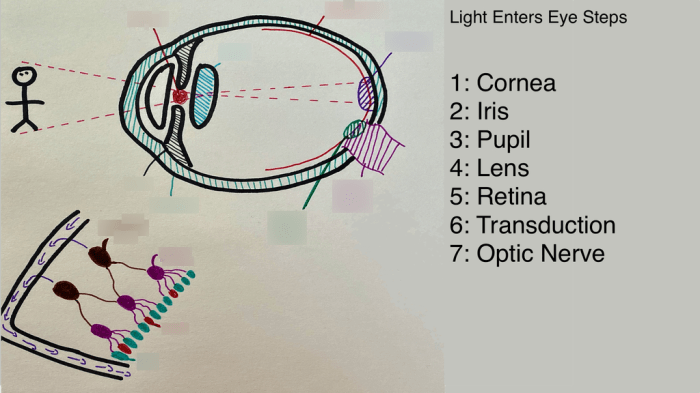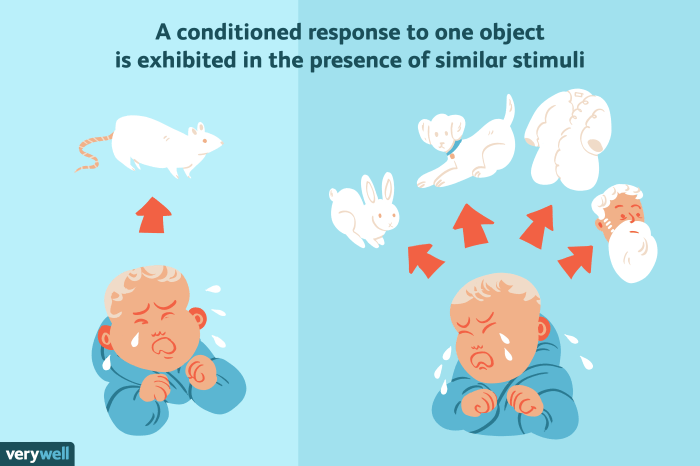AP Psychology Unit 4 Vocabulary: Delving into the intricate tapestry of the human mind, this unit explores the fundamental concepts, theories, and processes that shape our thoughts, emotions, and behaviors.
From defining key terms like “cognition” and “memory” to examining the role of motivation and emotion in our actions, this unit provides a comprehensive foundation for understanding the complexities of the human psyche.
Key Concepts

Cognitive psychology explores the mental processes involved in acquiring knowledge and understanding the world around us. Learning refers to the process of acquiring new knowledge and skills, while memory is the ability to store and retrieve information. Emotions, on the other hand, are complex psychological states that involve subjective experiences, physiological responses, and expressive behaviors.
Theories of Cognition
Cognitive psychologists have proposed various theories to explain how we process information and make decisions. Some prominent theories include:
- Information-processing theory:Views the mind as a computer that processes information in a series of steps.
- Schema theory:Proposes that we organize and interpret information based on existing mental frameworks.
- Gestalt psychology:Emphasizes the importance of perceiving the whole rather than the sum of its parts.
Theories of Learning
Learning theories explain how we acquire new knowledge and skills. Key theories include:
- Classical conditioning:Involves learning associations between stimuli.
- Operant conditioning:Focuses on the consequences of behavior and how they shape future actions.
- Social learning theory:Emphasizes the role of observation and imitation in learning.
Theories of Memory
Memory theories describe how information is stored and retrieved. Major theories include:
- Multi-store model:Proposes that memory is divided into three stores: sensory, short-term, and long-term.
- Working memory model:Focuses on the temporary storage and manipulation of information.
- Episodic memory:Stores memories of specific events.
Theories of Emotion
Emotion theories attempt to explain the nature and function of emotions. Key theories include:
- James-Lange theory:Proposes that emotions are physiological responses to stimuli.
- Cannon-Bard theory:Argues that emotions and physiological responses occur simultaneously.
- Cognitive appraisal theory:Emphasizes the role of cognitive processes in triggering emotions.
Cognitive Processes
Cognitive processes encompass the mental operations involved in acquiring, storing, and using information. These processes are fundamental to our everyday functioning, enabling us to perceive, think, learn, and make decisions.
The information processing model suggests that cognitive processes occur in a series of distinct stages:
- Attention:The selective focusing of cognitive resources on specific stimuli.
- Perception:The process of interpreting and organizing sensory information.
- Decision-making:The process of choosing among multiple alternatives.
These stages are interconnected and influenced by various cognitive structures, including:
Working Memory
Working memory is a limited-capacity system that temporarily stores and manipulates information for ongoing cognitive tasks.
Long-Term Memory
Long-term memory is a vast and relatively permanent store of knowledge and experiences that can be accessed when needed.
Cognitive processes are essential for effective functioning and underlie our ability to navigate the world around us.
Learning and Memory

Learning and memory are fundamental psychological processes that enable us to acquire, retain, and retrieve information. They play a crucial role in our ability to adapt to our environment, perform complex tasks, and communicate with others.
Types of Learning
There are several different types of learning, each with its own unique characteristics:
- Classical conditioning: A type of learning in which a neutral stimulus becomes associated with a meaningful stimulus, leading to a conditioned response.
- Operant conditioning: A type of learning in which a behavior is reinforced or punished, leading to an increase or decrease in the behavior’s frequency.
- Social learning: A type of learning in which individuals acquire new behaviors, values, or attitudes by observing and imitating others.
Theories of Memory
Memory is the process of encoding, storing, and retrieving information. There are several different theories that attempt to explain how memory works:
- Atkinson-Shiffrin model: A multi-store model of memory that proposes that information is processed through three different stages: sensory memory, short-term memory, and long-term memory.
- Working memory model: A model of memory that proposes that information is stored in a limited-capacity, temporary store that is used for conscious processing and manipulation.
Emotion and Motivation

Emotions are complex mental states that involve physiological arousal, cognitive processes, and behavioral responses. Motivation is the process that drives behavior and helps us achieve our goals.
Theories of Emotion
There are two main theories of emotion:
-
-*James-Lange theory
This theory states that emotions are caused by physiological changes in the body. For example, when we are afraid, our heart rate and breathing increase, and our muscles tense up. These physiological changes then lead to the experience of fear.
-*Schachter-Singer theory
This theory states that emotions are caused by a combination of physiological changes and cognitive processes. For example, when we are afraid, we might notice that our heart is racing and our muscles are tense. We then interpret these physiological changes as fear.
AP Psychology Unit 4 vocab can be a bit of a challenge, but don’t worry, there are plenty of resources available to help you out. One great resource is the vhl spanish 1 answer key . This website provides a comprehensive list of all the vocabulary words in Unit 4, along with their definitions and examples.
With this resource, you’ll be able to master the vocabulary in no time and ace your next AP Psychology exam.
Types of Motivation
There are two main types of motivation:
-
-*Intrinsic motivation
This type of motivation comes from within. We are intrinsically motivated to do things that we find interesting, challenging, or enjoyable.
-*Extrinsic motivation
This type of motivation comes from outside of us. We are extrinsically motivated to do things that we are rewarded for or that we believe will help us achieve our goals.
Developmental Psychology

Developmental psychology is the scientific study of human development across the lifespan. It examines the physical, cognitive, social, and emotional changes that occur from conception to adulthood and old age.Developmental psychology is a multidisciplinary field that draws on insights from a variety of disciplines, including psychology, biology, sociology, and anthropology.
Developmental psychologists use a variety of research methods to study human development, including longitudinal studies, cross-sectional studies, and experimental studies.
Piaget’s Theory of Cognitive Development, Ap psychology unit 4 vocab
One of the most influential theories of cognitive development is Piaget’s theory. Piaget proposed that children’s cognitive development progresses through a series of four stages:1.
-
-*Sensorimotor stage (birth to 2 years)
During this stage, infants learn about the world through their senses and motor skills. They explore their environment by touching, tasting, smelling, and listening.
- 2.
- 3.
- 4.
-*Preoperational stage (2 to 7 years)
During this stage, children begin to use language and symbols to represent their thoughts. They can think about things that are not present in their immediate environment, but they are still egocentric and have difficulty understanding the perspectives of others.
-*Concrete operational stage (7 to 11 years)
During this stage, children become more logical and can think about things in a more concrete way. They can understand the concept of conservation and can solve simple problems.
-*Formal operational stage (11 years and up)
During this stage, adolescents and adults develop the ability to think abstractly and reason hypothetically. They can think about things that are not present in their immediate environment and can consider multiple perspectives.
Vygotsky’s Theory of Cognitive Development
Another influential theory of cognitive development is Vygotsky’s theory. Vygotsky proposed that cognitive development is a social process that occurs through interaction with others. He believed that children learn best when they are working with others who are more skilled than they are.
Vygotsky’s theory emphasizes the importance of culture and context in cognitive development.
Factors that Influence Cognitive Development
Cognitive development is influenced by a variety of factors, including:*
-*Genetics
Genes play a role in cognitive development, but they are not the only factor.
-
-*Environment
The environment in which a child grows up can have a significant impact on their cognitive development. Children who grow up in stimulating environments with access to quality education and healthcare tend to have better cognitive outcomes than children who grow up in impoverished environments.
-*Culture
Culture also plays a role in cognitive development. Different cultures have different values and beliefs about what is important to learn and how children should be raised. These differences can lead to different patterns of cognitive development in children from different cultures.
Essential FAQs: Ap Psychology Unit 4 Vocab
What is the difference between classical conditioning and operant conditioning?
Classical conditioning involves learning an association between two stimuli, while operant conditioning involves learning an association between a behavior and its consequences.
How does working memory differ from long-term memory?
Working memory holds a limited amount of information for a short period of time, while long-term memory stores information indefinitely.
What are the key factors that influence cognitive development?
Genetics, environment, and culture all play a significant role in shaping cognitive development.